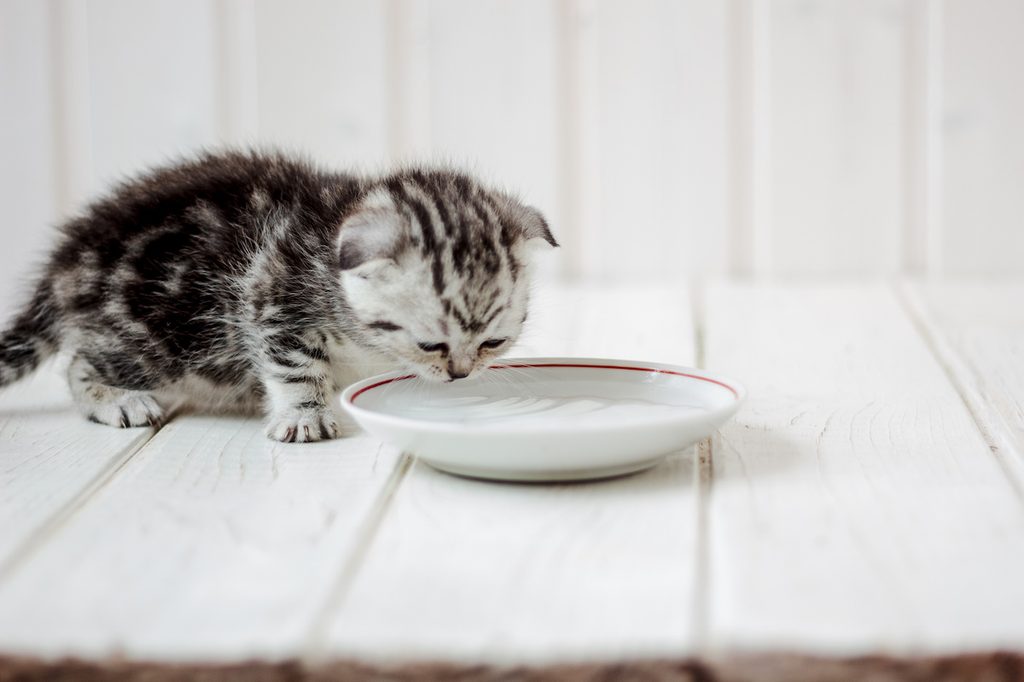
Your kitten is an essential part of your life, even if they’ve only been with you for a short while. You’ll want to take the best care of your new friend to ensure a long and happy life together, and a great way to do this is with a conscientious feeding routine. Coming up with a proper cat feeding schedule that meets your kitten’s needs is an essential first step for new cat owners, so don’t wait to plan this out.
Your kitten will need more fuel for his growing body than an adult cat, so be prepared to feed them more frequently. Here are some suggestions for how to feed your kitten so he stays healthy and maintains the proper weight as he grows. Good luck!
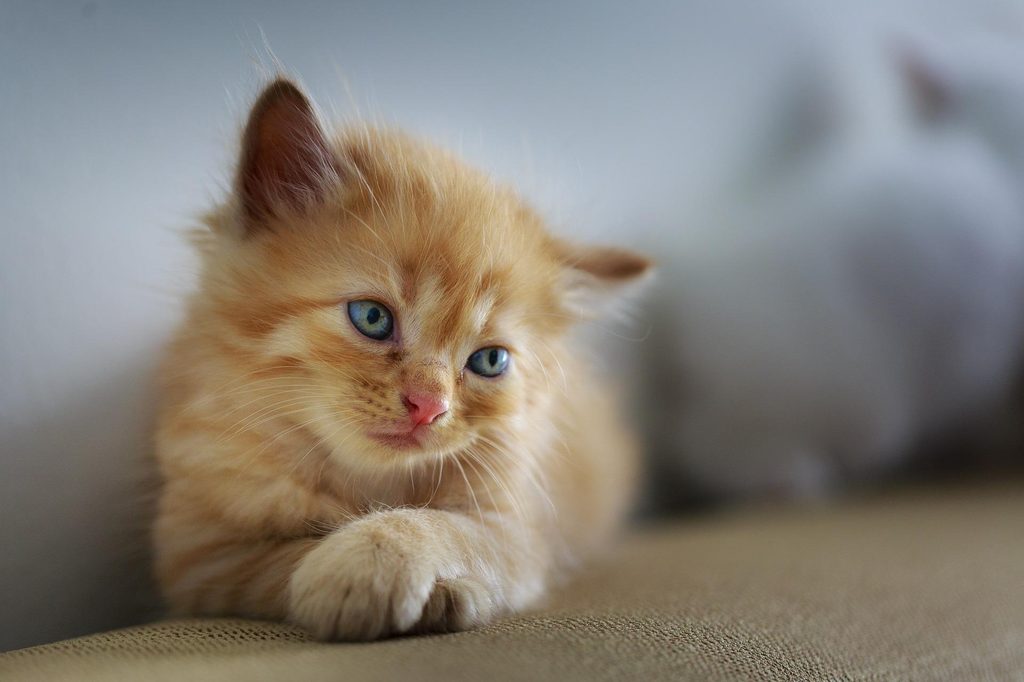
The right kinds of cat food
You can’t just toss down a bowl of adult cat food and expect your kitten to have enough to eat. Your kitten has different needs than an adult cat, so feeding the same food won’t get the job done. Luckily, a little research and planning can go a long way!
Even though very young kittens benefit from soft food as their teeth grow and come in, dry food doesn’t go bad as quickly as wet food (and it’s also cheaper). Wet foods offer more moisture content, but dry food can help kittens gain proper weight more easily due to the carbohydrate content. To get the best of both worlds, some people water down dry kitten food to create an easy-to-eat gruel.
Your schedule can also help determine whether wet or dry food is the best for your kitten as they grow. If you have to leave food out for your kitten during the day, dry food is the way to go. Wet food could be a better choice if you are home to clean the dish right away, or if your kitten is still struggling to chew food.
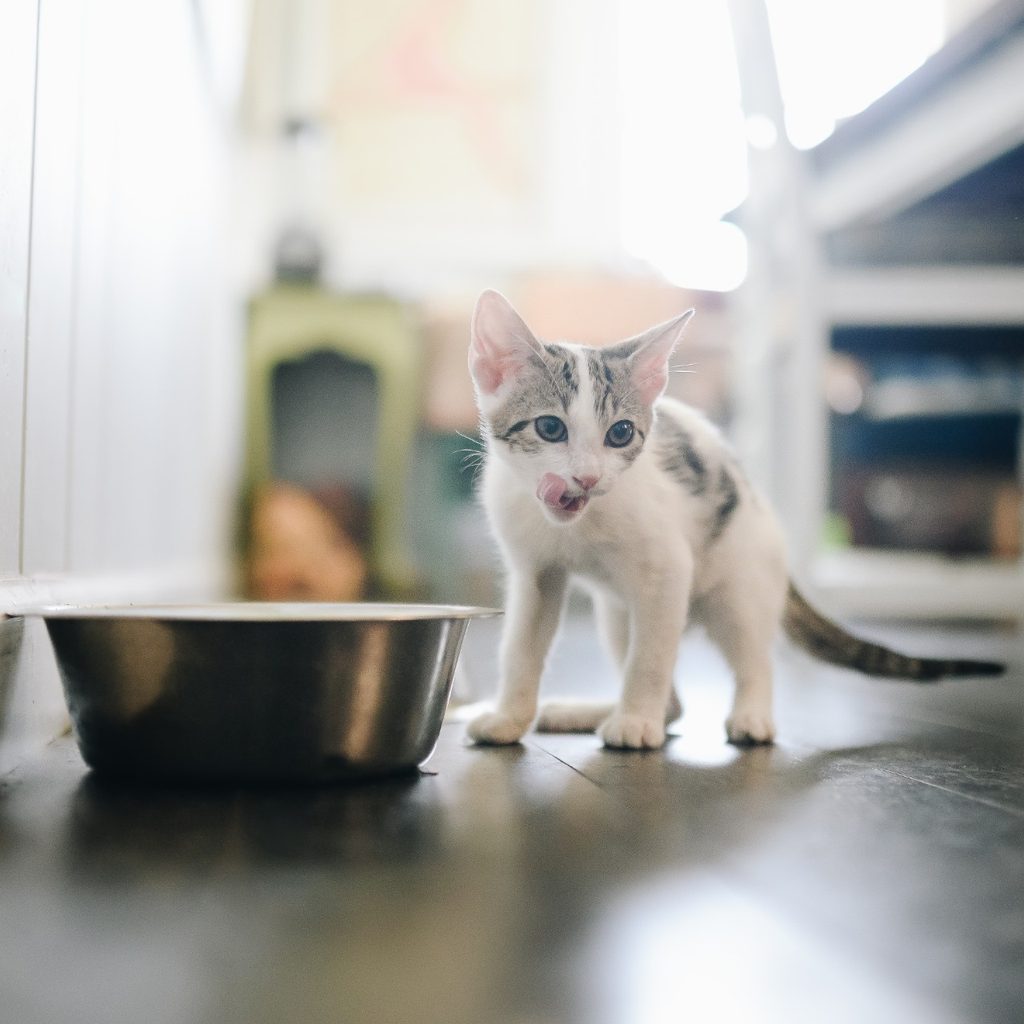
How often to feed kittens
Kittens will need to get meals three to four times a day once they’re weaned from their mother. The serving sizes will depend on your food’s recommended amounts as well as what your veterinarian says to do. Once your kitten reaches six months, however, most cats require two meals a day. This will be adjusted again when a cat reaches maturity when they should be fed once or twice a day. A feeding schedule is essential to help control your kitten’s weight and to establish good mealtime habits. Kittens will need to know what to expect around mealtimes, so consistency is key here. Remember to split up the daily portion size into three parts to ensure that your kitten doesn’t receive too many calories.
Consider the types of food you’re feeding your kitten, and choose only high-quality foods that have been tested. Cheap foods require more servings to give your kitten everything he needs to grow healthy and strong. One of the downsides is your cat could gain weight too quickly on poor-quality foods, as well as consuming less than ideal ingredients.

How much water should a kitten drink?
While kittens who are still drinking their mother’s milk (or formula) won’t need to drink water as adult cats do, you will need to add a water bowl to your kitten’s favorite area when they’re weaned. They should start to explore a very shallow dish of water around 4 weeks old (before they’re done weaning) just to get used to it, but they’ll usually learn to lap it up as they play and explore. This way, they’ll be comfortable with their water dish by the time they switch to solid food!
Most kittens and cats can self-regulate the amount of water they drink, so it’s important to keep fresh water available for your kitten at all times. If it seems like they aren’t drinking enough, though, you may want to switch up the type of dish or bowl you serve their water in.
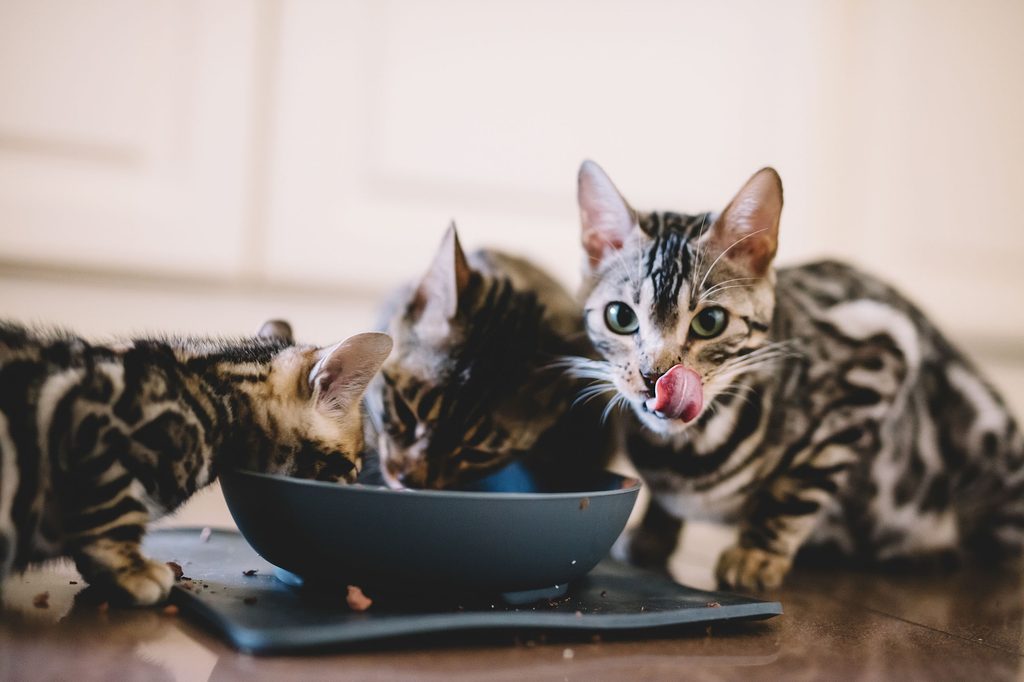
Develop a relationship with your vet
Your veterinarian is a valuable resource to ensure that you have the right feeding protocols for your new kitten. Your vet will determine the kitten’s health and offer advice for the type of food as well as portion sizes. If you have questions, give their office a ring! If your kitten seems to be gaining too much weight or not enough, your vet can determine the underlying cause and help you develop a plan. This ensures that your kitten grows up to be healthy.
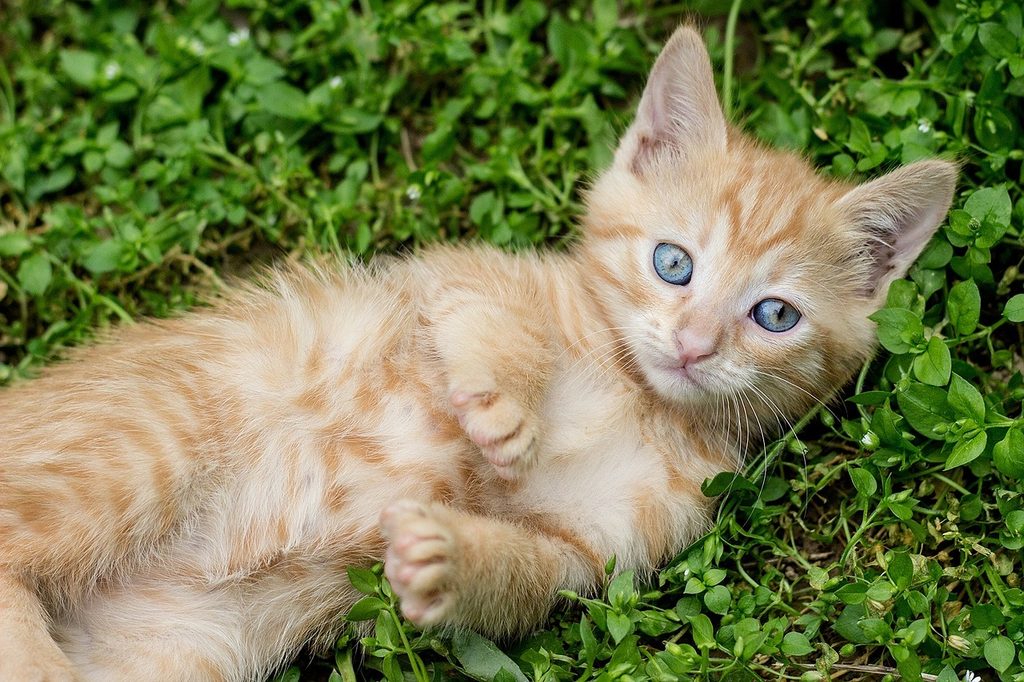
Frequently asked questions
Let’s take a look at some of the most common questions people have about feeding a kitten.
- How often should you feed a 7-month-old kitten? Check with your vet about your kitten’s health, but a 7-month-old should be transitioning to an adult feeding schedule of one or two times per day.
- Can you overfeed a kitten? Up to about 3 months of age, it’s difficult to overfeed kittens because they’re doing so much growing and have so much energy. You’ll need to be prepared to change your feeding habits often until your cat reaches about 6 months of age.
- Should I leave food out for my kitten? Grazing can make it difficult later to determine if your cat is receiving the right amount of nutrients. It’s best not to leave food out, but you can put a bit of dry food in a bowl if your kitten seems hungry during the night or between meals. Ensure your cat is regularly eating during meal times and avoid food treats just before meals.
- How do I know if my kitten is overeating? While it’s hard to overfeed a small kitten, it is possible. One sign of overeating is diarrhea. A kitten’s digestive system can’t handle the amount of food in its system, leading to diarrhea. Yellow and runny is a mild form, but your vet should see the kitten immediately if it turns gray.
- Why does my kitten always act like it’s starving? Your kitten is doing a lot in those first few months of life. They have tons of energy and are growing quickly. Developing an eating routine helps your kitten learn that meals are coming and provides well-balanced nutrition throughout the day.
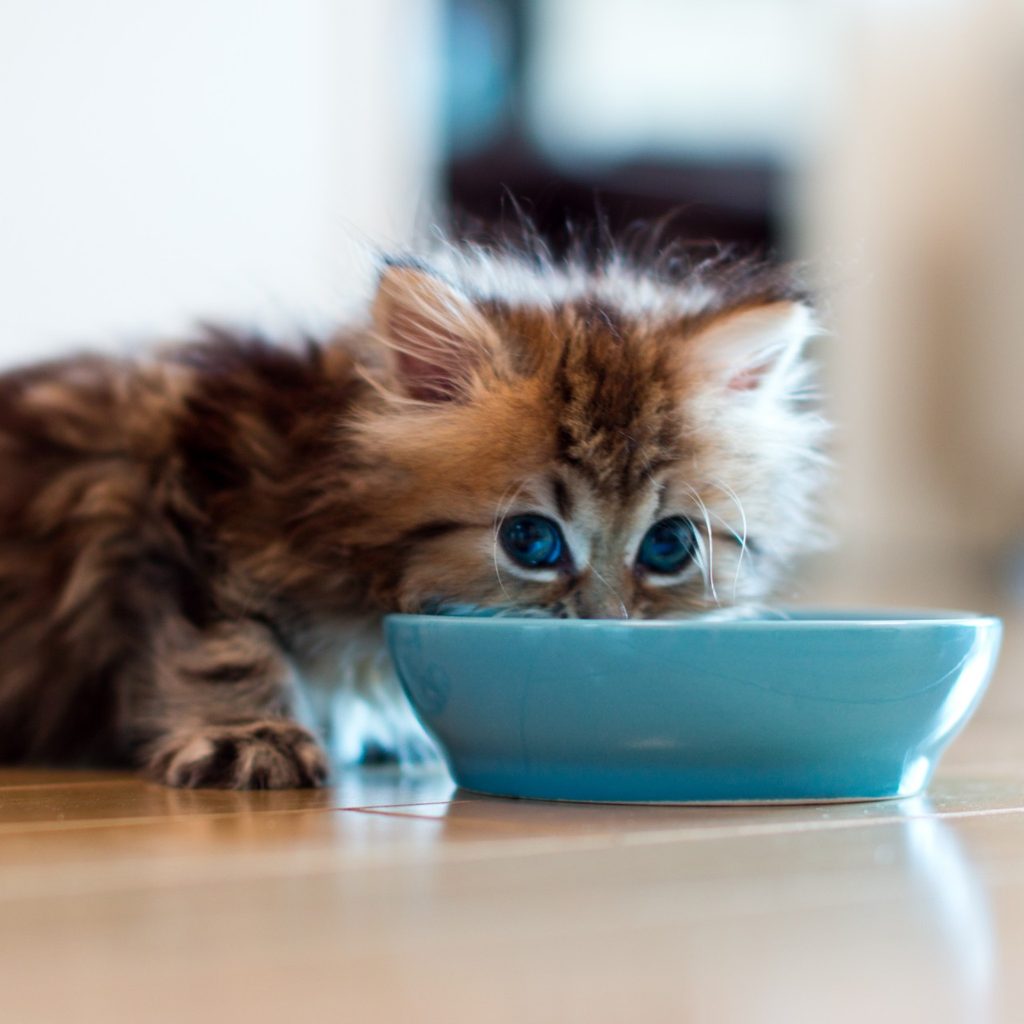
Getting on a schedule with your kitten
Whether or not this is your first kitten, teaching your kitten that meals are always coming is a vital part of good eating habits. Your kitten is doing a lot in those first few years, so a regular feeding schedule is going to do a lot of good. Consistency teaches your cat to trust that they will be fed, so you’re less likely to be bothered between meals, too!
Work with your veterinarian to watch your cat’s growth and weight closely in those first few months. Early nutrition develops into a lifetime of health and well-being, so ensure that your cat has what he needs to be healthy and strong from the beginning.
Adapt to your growing kitten’s nutritional needs and be consistent. The most critical piece of this puzzle is a continual dedication to your kitten’s health. With that in place, your kitten should grow up happy.



